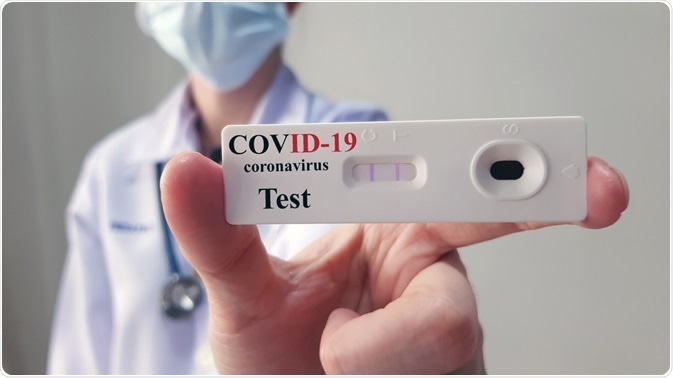The coronavirus antibody test is performed to determine the blood level of antibodies that are developed against the virus. This test determines if a person was infected by a coronavirus in the past.

Image Credit: joel bubble ben/Shutterstock.com
What is coronavirus?
Coronaviruses are a group of viruses that cause respiratory infections in humans. The infections can range from mild (common cold) to severe (Middle East Respiratory Syndrome (MERS) and Severe Acute Respiratory Syndrome (SARS)).
Coronavirus disease 2019 (COVID-19) is a severe, highly infectious disease caused by a novel coronavirus named severe acute respiratory syndrome coronavirus 2 (SARS-CoV-2).
How coronavirus is detected in COVID-19 patients?
Presently, two types of diagnostic tests are approved by the U.S Food and Drug Administration (FDA) to diagnose COVID-19: a molecular test and an antigen test.
In molecular tests, the viral genetic material is detected using polymerase chain reaction (PCR). The test is done using biological fluid collected from a nasal or throat swab or using saliva. Some at-home test kits, such as nasal swab kits and saliva kits, are also effective in detecting coronavirus.
In antigen tests, biological samples collected from nasal or throat swabs are used to detect certain viral proteins. Compared to molecular tests, antigen tests are less sensitive and accurate, because there is a possibility of getting false-negative results.
What is the coronavirus antibody test?
Antibodies are produced by the immune system to identify and destroy harmful foreign substances (antigens), such as bacteria and viruses.
Coronavirus antibody tests are done to detect the presence of antibodies in the blood that have developed against coronavirus. A positive coronavirus antibody test presumably means that a person was infected by coronavirus at some point in the past. However, a positive result does not indicate that a person is currently having a coronavirus infection.
How do coronavirus antibody tests work?
In the case of SARS-CoV-2, a detectable antibody level in the blood can be achieved 1 – 2 weeks post-infection.
The basic method of coronavirus antibody test involves examining the binding of targeted antibodies to specific viral proteins (antigens). The platforms that are used for performing coronavirus antibody tests include enzyme-linked immunosorbent assay (ELISA), chemiluminescent immunoassay, and lateral flow assay.
For the test, collected blood samples are incubated with the viral antigens on an assay platform. If the antibody against coronavirus is present in the blood, it will bind to the viral antigen, and a positive result will be obtained.
The viral antigens that are used to detect antibodies against coronaviruses include spike protein (a specialized surface protein that binds the host cell and facilitates viral entry), nucleocapsid (an RNA-binding protein used to form the viral capsid), and receptor-binding domain (a part of spike protein that binds the host receptor for coronavirus namely angiotensin-converting enzyme 2 (ACE2)).
The types of antibodies being detected via antibody tests include IgM (usually the first antibody to be produced upon infection), IgG (the most abundant antibody in the blood), and IgA (protects mucosa). The total antibody level can also be measured.
How accurate is the coronavirus antibody test?
The accuracy of coronavirus antibody tests depends on many factors, such as the duration between infection onset and test execution, antigen specificity, and types of antibody being analyzed.
Since the immune system usually starts producing antibodies within 1 – 3 weeks post-infection, a test done soon after the viral exposure may not be able to detect antibodies in the blood. In addition, there are possibilities of getting false-positive or false-negative results.
A false-positive result means a person is tested positive in the antibody test but does not have the antibodies in the blood. Likewise, a false negative result means a person is tested negative in the antibody test, despite having detectable antibody levels in the blood. The likelihood of getting false-positive results is higher in a community where the prevalence of coronavirus infection is very low.
Cross-reactivity is another concern that can significantly reduce test accuracy. Antibody assays designed specifically for the novel coronavirus can cross-react with related viruses (common coronavirus, SARS-CoV, and MERS-CoV), and thus, can give false-positive results.
What are the benefits and limitations of coronavirus antibody tests?
If a person tests positive in an antibody test but does not have disease-related symptoms, there is very little possibility of having a current infection. However, having a negative result in the antibody test does not rule out the possibility of a current infection. Some people may take longer to make antibodies, and the negative result may thus be due to inaccurate test timing.
Studies conducted on people with novel coronavirus infection have suggested that the presence of antibodies in the blood may reduce the likeliness of viral reinfection. However, recent research suggests this may not be permanent. A 2021 study by the Public Health England (PHE), currently in preprint*, suggests that seroconversion of antibodies for COVID-19 leads to protection for at least five months at a level of 83%.
Nevertheless, an antibody test can be important for identifying parts of a population that have been exposed to coronavirus and have developed herd immunity, at least in the short term.
An antibody test can also be used to identify people who have recovered from the coronavirus infection recently and are eligible for donating blood for convalescent plasma therapy. However, recent research questions the effectiveness of plasma donation for COVID-19.
Coronavirus Antibody Tests—What They Tell Us
*Important Notice
This article contains information from a preliminary scientific report that is not peer-reviewed and, therefore, should not be regarded as conclusive, guide clinical practice/health-related behavior, or be treated as established information.
References
Further Reading